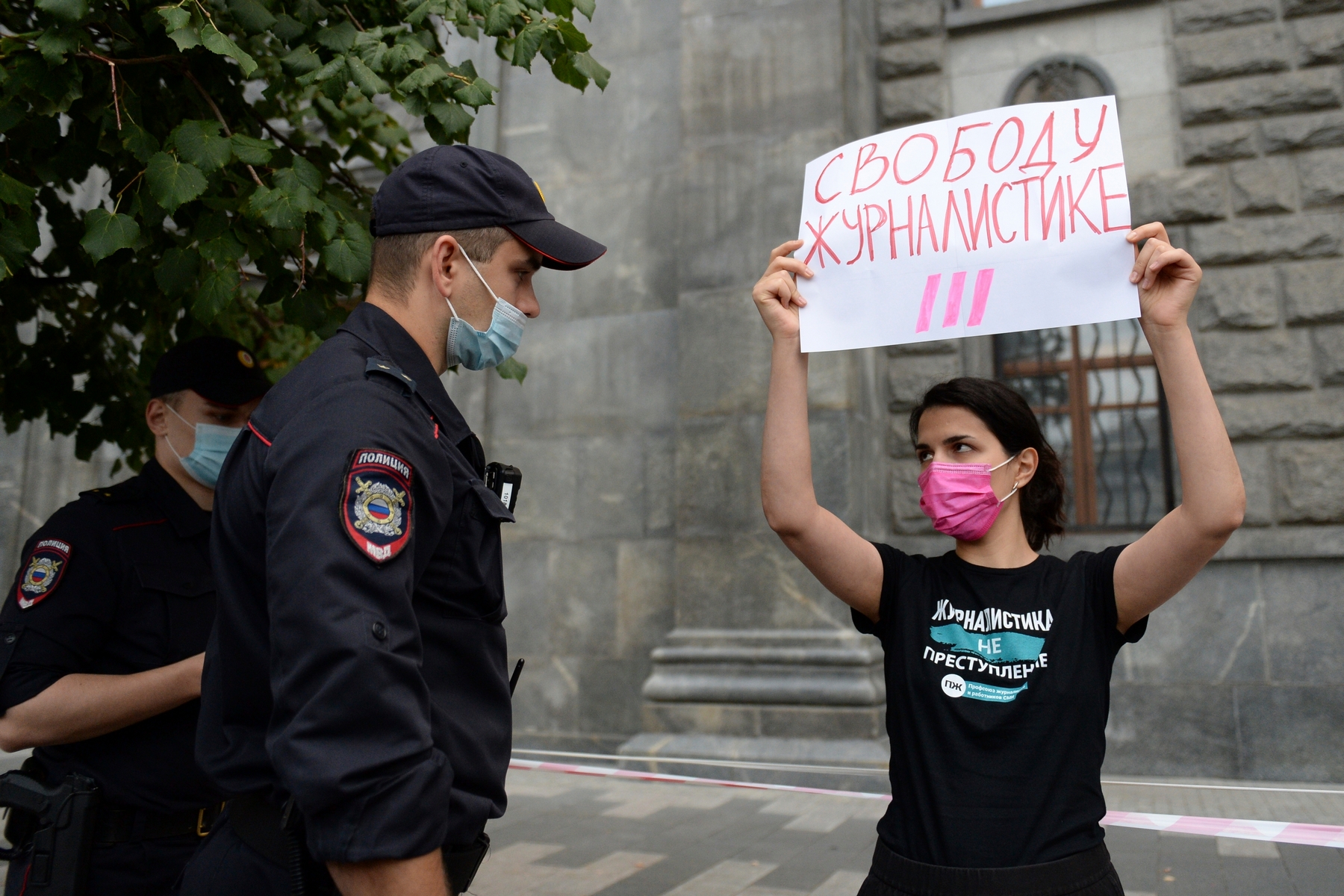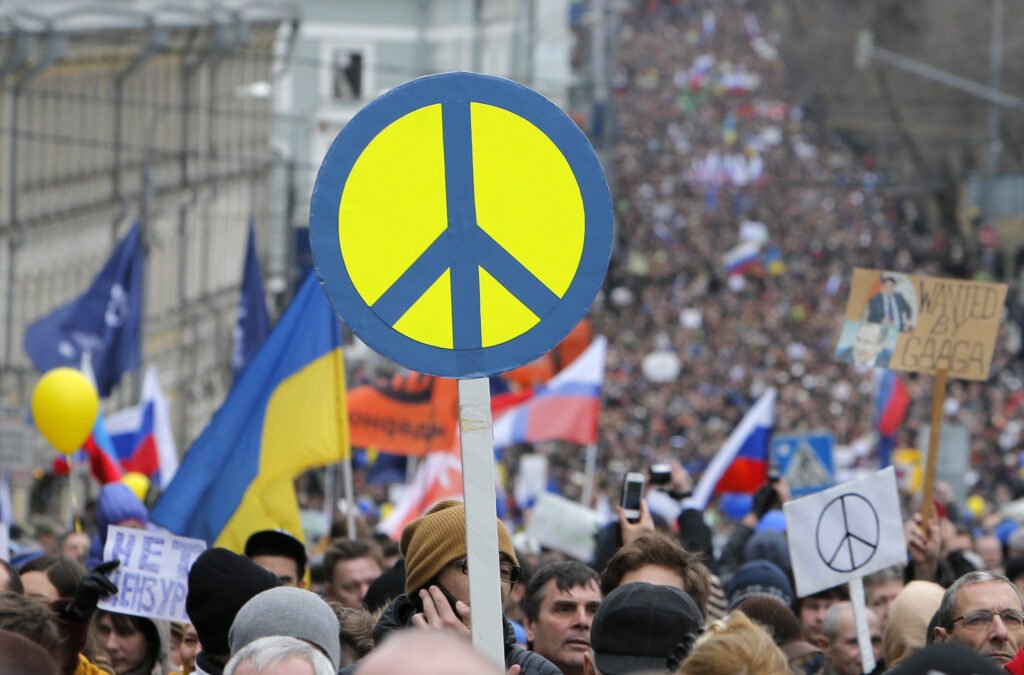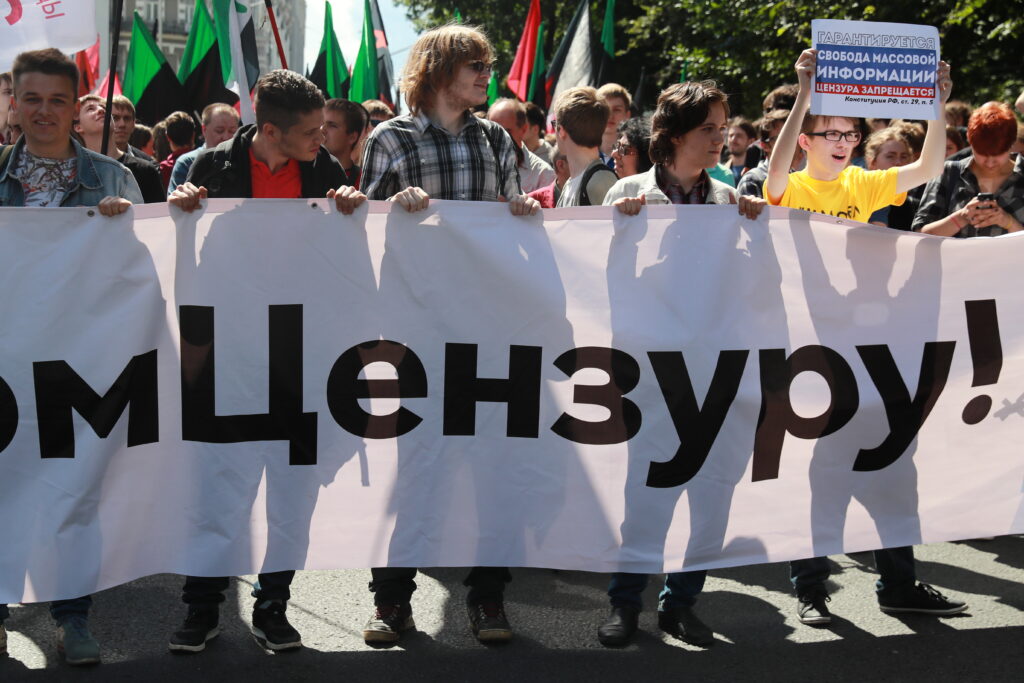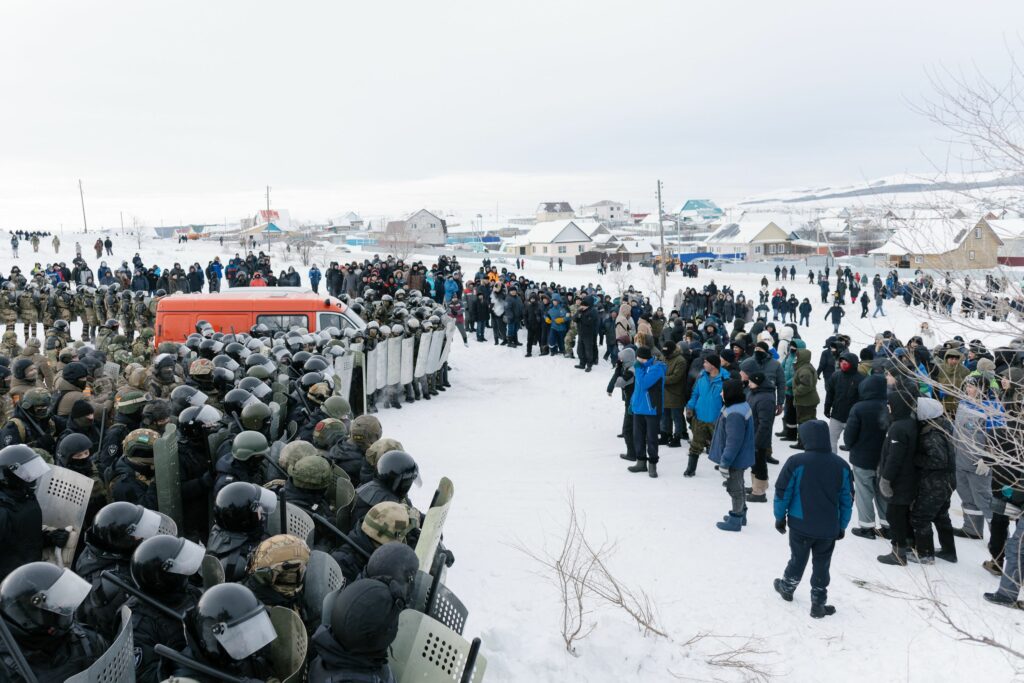The Russian Ministry of Justice on August 19 designated Dozhd, the country’s last remaining independent TV channel, as a “media organization performing the functions of a foreign agent”. Besides the label’s unpleasantness and the difficulties it imposes on the channel’s work, the government’s justification was so vague that even the Presidential Council for Human Rights had to intervene. I say “even” because this institution has been only imitating the defense of human rights ever since its leadership reshuffle, at least when concerning politics. For example, during the 2019 protests against the Moscow electoral authorities’ blockage of opposition candidates, Human Rights Council chairman Valeriy Fadeev ended up opposing an amnesty for arrested and criminally-charged peaceful protestors. Or when the authorities forcefully dispersed the demonstrations in support of Alexey Navalny in 2021, Fadeev was more worried about the rights of police officers than those of injured citizens.
Recently, state human rights officials met with Justice Ministry representatives to ask about the circumstances where a media organization or a journalist can be labeled a “foreign agent.” The answers they received were shocking. It turns out that you do not at all need to be an opposition activist or receive a foreign paycheck. Attending a foreign conference sponsored by the inviting party is enough. So is receiving an international prize. Even accepting money from foreign friends or relatives suffices for someone to morph into a “foreign agent”. The Justice official did not exaggerate; he simply quoted the Russian legislation, which surprised the Human Rights Council only now, though it strangely did not back when it was originally passed.
Right from when it was first proposed, this was obviously a powerful tool of repression against freedom of speech that has fallen into the government’s hands. Most importantly, this tool is simple and universal: the law’s criteria are so vague that anyone can be targeted as a “foreign agent,” as long as there is political motive to do so.
The war on nonprofits and NGOs
And it has been a long time coming. Back in 2012, the first targets for repression were nonprofit and nongovernmental organizations. The legislation itself was a reaction to urban protests against the fraudulent Duma elections in December 2011. Its authors always pointed to America’s eponymous laws with a wink and a nod.
The United States does, after all, have the Foreign Agent Registration Act, known as FARA, since 1938. Consequences for violating it are truly unpleasant, up to a jail term. But following an amendment in 1966, FARA mainly applies to political lobbyists, requiring U.S. authorities to prove that a suspected foreign agent both received money from abroad and acted “at the order, request, or under the direction or control” of a foreign government. The Russian government has no such burdens of proof. It is enough for them to point out two facts: First, that an NGO is receiving foreign funds. The size of foreign contributions, their source, and purpose does not matter. The scope of the law can also target “other material assistance” besides money. Second, the NGO must engage in “political activity.” This is vaguely defined as “participation (including by financing) in the organization and conduct of political action with the goal of influencing government decisions in the formation of state policy, and the formation of public opinion toward certain ends.” Clearly, anyone who criticizes the state can be held accountable for “political activity” under this definition.
And that is exactly what happened. The Golos vote monitoring group was not the only one to fall into the “foreign agent-NGO” registry, although this was a logical outcome of its role in the 2011-2012 electoral protests. The ‘Memorial’ human rights group, which researches Soviet-era political repression, also got hit with the label. Even the Saratov Regional Organization for Diabetics got listed as a “foreign agent.” Organizations on the list are mandated to mark all their materials as “foreign agent”-provided, must comply with cumbersome and expensive reporting requirements, and, in case of violation, their leaders face steep fines and jail terms. Many NGOs that receive this label are forced to dissolve.
Here are a few examples to show the ease of turning an organization into a foreign agent on a whim. Let’s start with the “finance” offense. Is the group not receiving funds from abroad? That’s an easy fix. In 2019, the Justice Ministry added Alexey Navalny’s Anti-Corruption Foundation to its foreign agents list (currently this organization is designated as extremist and banned on Russian territory) due to money transfers from the United States and Spain. A Russian citizen living in the U.S. along with a certain Spaniard named Roberto Fabio Monda Cardenas, made donations that were microscopic in comparison to the Foundation’s overall budget. When Russian journalists quizzed Cardenas, he could not explain why or to whom he donated the tiny sum. But this was enough to overrule any appeal of the label in court. In fact, no one has successfully appealed a “foreign agent” label, although many have tried.
Let’s move on to the “political activity” offense. Just days ago, the freelance journalist group called ‘Fourth Sector’ was added to the “foreign agents” register. The authorities accused them of writing critical articles about the police and the penitentiary service, picketing in support of arrested fellow journalists, and propagandizing a “loyal attitude toward sexual relations among members of the same sex,” thereby aiding the “formation of social-political views and beliefs in violation of Russian state policy.” This is a reference to a few articles on LGBT issues.
That’s it. Enough to join the list.
The crusade against the media
In 2017, amendments to the Law on Media added a clause about “foreign media agents.” Initially, the label applied to foreign legal entities or organizations without legal status receiving funds from abroad (again, without any specificity). New laws in 2019 and 2020 allow the government to add any Russian media or individual to the list. Political activity is not a factor: simply being a journalist and writing about anything is enough to be a target. There are no legal limitations to the “foreign media agent” register. Theoretically, writing about the lives of aquarium fish could land you on the list.
“Foreign media agents” – individuals and organizations alike – face the same obstacles as NGOs: difficult reporting requirements and serious consequences for mistakes. They are also required to label every publication (even social media posts) with an all-caps warning that it is published by a foreign agent. “Foreign media agent” individuals must also register legal entities in their own names in order to report their income and losses to the Justice Ministry. By the way, you don’t have to be a journalist to be added to this list. Simply “spreading information to an indefinite amount of entities” – in other words, being a social media user – is enough to become a “foreign media agent.” Because the law is applied selectively, people do not need popularity to become a target, but just a little bit of bad luck.
Obviously, this is a serious violation of media rights. It is practically impossible for “foreign media agents” to receive accreditation for government events. The label can also scare away commentators and experts, not just those affiliated with the government, because “participation in the production of foreign agent media content” is a “foreign agent” charge of its own. With a label like this, it is not so easy to find employment in Russia’s shrinking media job market.
Voice of America and Radio Free Europe/Radio Liberty, along with some of its subsidiaries, were the first to join the list of media organizations “performing the role of foreign agents.” Perhaps this was expected. But as early as December 2020, the government began adding people to the list the list, including human rights activist Lev Ponomaryov, journalists Lyudmila Savitskaya, Sergey Markelov, and Denis Kamalyagin, as well as the artist Daria Apakhonchich.
It is impossible to understand what these people have in common or why they were picked for the first fall of the axe. That is precisely the point of a repression mechanism: everyone must be afraid and understand that they are not safe.
An all-out attack
By April 2021, 17 “foreign media agents” were listed. That is the month when the list of “outcast” media and people began to grow. At the time of this writing, there are 43 entries on this list. Over half of them are journalists who worked for publications that are banned, “undesirable,” or designated “foreign media agents.”
Between April and August, the “foreign media agent” designation fell upon Meduza, ‘The First Anti-Corruption Media,’ Insider, VTimes, Dozhd, iStories, and 20 individual journalists. The authorities already blocked three publications sponsored by Mikhail Khodorkovsky (MBKh-Media, Open Media, and Dossier) and designated Proekt as an “undesirable organization,” an even worse status that essentially bans its existence. Considering this, it is clear that an all-out attack on Russian independent media is underway. The only somewhat well-known opposition media platform still at liberty from these designations is Novaya Gazeta. RBK, Kommersant, and Vedomosti have long stayed out of the government’s way. These three’s brightest political correspondents had resigned after scandalous editorial conflicts with investors, often ending up as “foreign media agents” due to their continued work. Gazprom-owned Echo of Moscow is hanging by a thread, thanks to editor-in-chief Alexey Venediktov’s careful diplomacy with the authorities. Nevertheless, the radio station is still rumored to be in line for a leadership change.
Strategy and tactics
Pundits often explain upticks in Russian repression as pre-election tactics. When the United Russia Party feels threatened, it seeks out and destroys potential sources of agitation. After elections, everything will return to normal. So the theory goes. But the current situation is different. All of the media under attack are not exactly popular, with the exception of Meduza. Most importantly, their main audience is already opposed to the Kremlin. United Russia can never win their vote. The authorities might be afraid of facing voters, but they’re definitely not afraid of the intelligentsia reading opposition media on the Internet. They are not the problem. United Russia’s real fear is the possibility of a mass protest vote by people exhausted from shrinking incomes, coronavirus lockdowns, and unpopular reforms. But these masses do not decide how to vote by reading a handful of niche media websites. Instead of repressing journalists, the government could deal with this by handing out cash, like President Putin is personally doing right now. Or, they could simply count the votes in September as they see “fit.” It’s more important who counts the votes than how people vote, after all.
The chief ideologists of Putin’s Russia – Putin himself, Secretary of the Security Council Nikolai Patrushev, FSB Director Alexander Bortnikov, and others as influential as them – clearly believe in their own propaganda messages with which they try to scare the population. They see themselves at war. Thankfully, it is an information war (for now). Their worldview, formed in the Soviet security services, does not see shades of gray. They see an enemy at the gates. This enemy is laying siege to their national stability, sovereignty, and is propagating alien values. According to this logic, any criticism of the Russian state must be foreign-inspired. There must be a coordination center out there – perhaps in Washington – that is packaging Russophobia (i.e., any criticism of Putin) to be spread by its paid mouthpieces in Russia. Obviously they must be fought. The first step is to name and shame them as “foreign agents,” leaving them no place to hide.
Even the wording copied from American law has fit into Russian reality surprisingly well. It magnificently coincides with the leadership’s views and has the right ring for simple folks: a poll by the Levada Center (included on the list of nonprofit organizations performing the functions of a foreign agent) found that Russians’ most preferred synonym for the term “foreign agent” was “spy.”
This is not an election tactic. This is a long-term strategy for regime survival. This regime is fighting a war that will claim many more victims. It is just an added convenience that it began right before an election that “foreign media agents” could be banned from reporting. But it is just a convenience.
Surprisingly, Alexey Navalny is playing a key role in this strategy. He is not just the number one opposition leader: he is the founder of an investigative powerhouse that has spent years reporting on the authorities’ shady incomes, yachts, and palaces that they ought to do a better job of hiding. They do not realize how transparent the world has become as they remain fixated on the Russia they knew in their youth – the Russia they try to drag back from the past. So they are inclined to believe that any open source investigation must be the nefarious work of a foreign intelligence service. There can’t be any other way.
Navalny’s films about Putin’s palace and his own poisoning, which gathered over a hundred million views, were the last straw. The Kremlin’s patience ran out: Navalny is in jail, his organization is destroyed, and his allies are forced to flee Russia. And from the state’s point of view, there is no logical reason to tolerate lesser enemies on the information battlefield. Navalny’s arrest did not mean the end of the world: no revolution broke out. So why would the Kremlin think twice about crushing small, irritating publications like VTimes or Dozhd?
The majority of the media players under attack in 2021 deal with investigative journalism. There is no need for the government to prove that they are foreign mercenaries in a great war: their successful record of investigations is reason enough to stomp them out of existence. “Foreign agent” Meduza is an exception, since it is too popular. “Foreign agent” Dozhd is a different story. For the old generation in charge of Russia, television is still the number one media source. The very idea of an independent TV channel unthinkable oxymoron to them. Let us remember that Putin began his reign by taking over the large, oligarch-controlled TV channels. Large and oligarchic channels are long gone, but that leaves no permission for a small but independent one to exist. By the way, Dozhd’s woes did not begin – and will not end – with the foreign agent listing in August 2021.
The real repression is yet to come. This is just the opening of the final battle against the Russian government’s enemies who are allegedly taking the West’s money in exchange for spreading its alien values in Russia. The real struggle lies ahead. Investigative journalists are the first on the hit list. But it is a long hit list.










